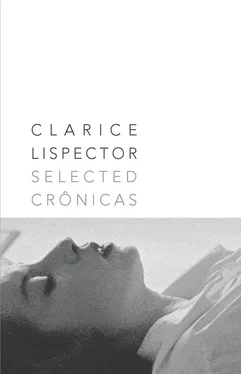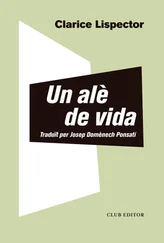I looked at everything: the odd person on the street, the journey through the countryside with animals to be seen everywhere. ‘Look, a real pig!’ I once exclaimed, and that cry of ecstasy became a family joke and thereafter my sisters would often tease me by calling out: ‘Look, a real pig!’
We passed magnificent horses just standing there in the fields, waiting for dawn.
I do not know about the childhood of others. But this trip to Olinda every morning gave me such happiness. And helped me believe in future happiness. My capacity for happiness was unfolding. And amidst the unhappiness of my childhood, I clung to this daily trip as if I were travelling to some enchanted island.
Dawn broke inside the tram. And my heart would beat faster as we approached Olinda. Having finally reached our destination, we jumped down and headed for the bathing-huts, trampling soil that was already a mixture of sand and weeds. We changed in the huts. And no body ever flowered like mine as I stepped onto the beach in anticipation of what awaited me. The sea at Olinda could be dangerous. The water was shallow for a bit, then there was a sudden drop of at least two metres.
There were other people there who believed in bathing before sunrise. And a lifeguard who, for a pittance, would accompany the women into the water. He would stretch out his arms and, supporting a woman on each arm, he would protect them from the strong waves.
The smell of the sea penetrated and intoxicated me. Seaweed floated on the surface. I can see just how difficult it is to express what that sea-bathing on an empty stomach meant to me in terms of pure life as the pale sun rose on the horizon. I become so emotional that I cannot write. The sea at Olinda was salty and rich in iodine. And I did what I would always do: holding my hands together in the form of a shell I would plunge them into the sea and bring some water to my lips. I drank that water each morning, in my desire to be united with the sea.
We never stayed for long. Once the sun had risen it was time to leave, because father always arrived early for work. We dressed quickly, our clothes impregnated with brine. My hair was matted with salt.
Then we stood in the wind, waiting for the tram arriving from Recife. Back inside the tram, my hair soon dried out, caked with salt. From time to time I would lick my arm to taste that thick coating of salt and iodine.
We reached home and only then did we have our breakfast. And when I remembered that I would be going back to the seaside next morning, I grew solemn at the thought of all that adventure and good fortune.
My father believed we should not shower immediately with fresh water but insisted that we allow the effect of the salt-water to work on our skin for several hours. And I was always reluctant to take a shower which would wash away the salt and iodine and remove all traces of the sea.
Who can restore that happiness? How can I renew that sensation of radiant innocence beneath the crimson glow of sunrise? Never more?
Never more.
Never.
She could not bear to look at her father when he was happy. For at such moments, this strong, embittered man would become entirely innocent. And so defenceless. Oh God, how he would forget he was mortal. And oblige her, a mere child, to cope with the heavy responsibility of knowing that even our most innocent animal pleasures die. At such moments when he forgot he was going to die, her father transformed her into the Pieta , the mother of man.
I do not know if many people have made this discovery — but I know that I have. I also know that to discover land is a platitude which has long been divorced from what it expresses. But everyone should try at some time or other to rediscover the sensation that underlies the expression: to discover land.
I once had this experience in Italy while making a train journey. It need not be Italy. It could even happen in Jacarepaguá. But this was in Italy. The train was speeding along and, after a sleepless night in the company of a Swedish woman who spoke nothing but Swedish and a miserable cup of stale coffee smelling of railway stations, suddenly we were passing through countryside. The sweet Italian countryside. It was early spring, the month of March. Nor does it have to be spring. It only has to be — earth. And for that matter, we all have earth under our feet. Yet it was so strange to feel oneself living on top of a living thing. When feeling nervous, the French say they are sur le qui-vive. We are perpetually on top of what is living.
And to earth we shall return. Oh, why were we not allowed to discover for ourselves that we shall return to the earth? We were warned before being able to discover this for ourselves. It cost me considerable effort to discover that: to earth we shall return. The discovery caused me no sadness, it was exciting. Just thinking about it made me feel myself surrounded by the earth’s silence. By this silence which we foresee and seek out before time becomes a reality.
Somehow everything is made of earth. A precious substance. Its abundance does not make it any less strange to feel — for it is so very difficult to feel that everything is really made of earth. Such unity. And why not the soul as well? My soul is woven from the finest earth. And is the flower not made of earth?
And since everything is made of earth — what a wondrous, inexhaustible future we possess. An impersonal future which surpasses us. Just as the human race surpasses us.
Earth showed her bounty by separating us into persons — we have repaid her by being nothing other than earth. We are immortal. And I feel moved and committed.
This was when she went through a crisis which seemed to have nothing to do with her life — a crisis of deep compassion. Her head was so narrow, her hair so neatly combed, that it could scarcely support all that compassion. She could not bring herself to look at a tenor while he was singing. She would turn her face away, pained, unable to bear it, unable to watch the singer being applauded. And sometimes she would press her gloved hands to her bosom, overcome with remorse. She suffered without recompense, without so much as feeling sorry for herself. Until one day she was cured like a wound which had healed.
It was this same woman, who suffered from sensitivity as if it were a disease, who chose a Sunday when her husband was away from home to go out and look for a seamstress who could do fine embroidery. It was more of an outing. What could anyone have against it? Besides, she often took a stroll. As if she were still a little girl walking along the pavement. Especially when she felt her husband was betraying her.
So off she went one Sunday morning to look for a seamstress. She found herself walking down a muddy track full of chickens and naked urchins. The seamstress lived in a house with a brood of starving children and a husband dying of tuberculosis. She told the seamstress what she wanted but the seamstress refused to make her a blouse that needed cross-stitching. She hated doing cross-stitching!
The woman left, outraged and puzzled by the seamstress’s refusal. She felt almost unclean in the morning heat. And ever since childhood, she had always liked to think of herself as being scrupulously clean.
Back in her own house, she had lunch, then lay down in the semi-darkness of her bedroom, thinking mature thoughts devoid of any resentment. At least for once she was not feeling anything. Apart from this waiting. In semi-darkness.
Not so long ago I took a taxi and lit a cigarette. When we stopped at the traffic lights, the driver asked me:
Читать дальше












